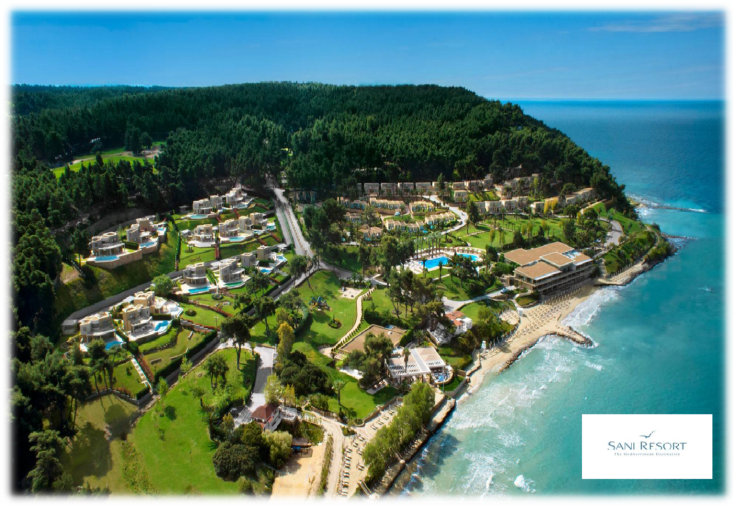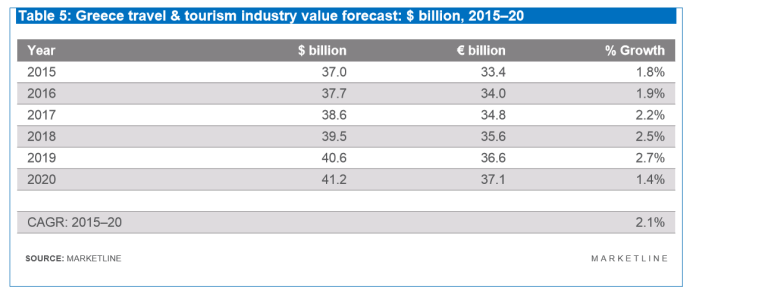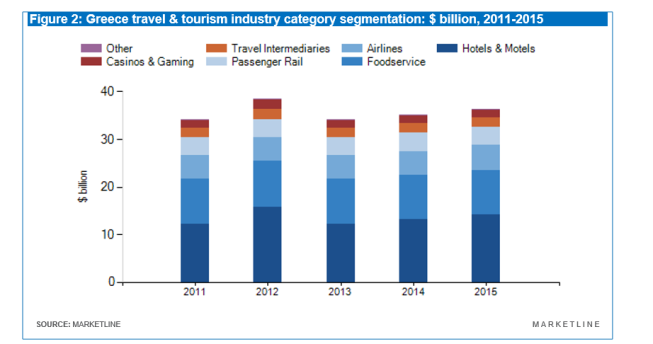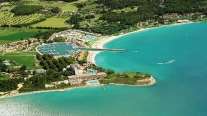Strategic Resort Hotel Management

Corporate Social Responsibility
McWilliams et.al. (2006, pg. 4) defined CSR as “situations where the firm goes beyond compliance and engages in “actions that appear to further some social good, beyond the interests of the firm and that which is required by law” and state that CSR should be used as an element of corporate strategy. According to Fombrun and Shanley (1990) socially responsible behaviour can lead to improve firms image and reputation and therefore increase visitors number. However, Friedman (1970) argued that the motivation is to serve the bottom line and as Trexler (2008) stated ethics and moral values have no place in the business world; considering that CSR and “green” programmes can be strategic responses to market realities, such as the rising of fossil fuel. Nevertheless, this does not change the fact that some activities that are motivated by the bottom line may have social benefits.
Sani green programme has 3 main objectives with a well-defined plan and measurable targets; Sustainable hotel operation, protection and enhancement of local biodiversity, local community support and human capital development. The green programme so far has excellent outcomes in all 3 objectives (Resort,2016) and as aforementioned promoting and demonstrating CSR results can be very beneficial for the image and reputation of the resort. CSR can be advertised through numerous channels; such as internet, sustainability reports and media (Danuta de Grosbois,2011). Despite image, measuring the economic benefits of this objectives is crucial for resorts financial sustainability. Energy and water consumptions can be easily measured and so calculate the ROI. McWilliams and Siegel (2001) suggested a model based on RBV to address optimal investment in CSR and stated that managers can determine the appropriate level of investment in CSR by conducting cost benefit analysis in the same way that they analyse other investments. In terms of CSR towards the employees, benefits or loyal bonuses can mitigate the effect of staff turnover, lowering the expenses for training new staff and provide a standardised customer service. Sani is already affiliated with some NGOs (Appendix) but it would be advisable to increase their number.
In summary, Sani resort must set achievable goals for CSR and display them to the public in order to boost its reputation and attract more “green” costumers. The financial measurement of the outcomes in all CSR programmes must be calculated and measured.
Life cycle
Understanding the life cycle of a product,here sani resort, is an important principle in order to make more profit and stay in business (Day, 1981). It can also be applied in forecasting and developing appropriate marketing strategies, depending on what stage the product is.
In order to identify the stage of a product in the life cycle Day (1981) suggested feutures and patterns at each stage.
|
|
Stages |
|||
|
Introduction |
|
Maturity |
Decline |
|
|
Sales |
|
High |
High |
Low |
|
Investment cost |
Very high |
High (lower than intro stage) |
Low |
Low |
|
Competition |
Low or no competition |
High |
Very high |
Very High |
|
Profit |
Low |
High |
High |
Low |
Table.1
According to the balance shits ( Appendix ) profit had a step increase in 2015 reaching almost €26mil (up from €5mil in 2011) and the total revenue reached €131,69mil (up from 2011 €89,42mil). The competition is still on high levels and the resort keep investing money on their facilities. From these facts, an assumption that the resort is on the growth stage can be made (Product Life Cycle Stages, n.d.).
Box (1983) claimed that there are 2 courses of action to extend the lifetime of a product; the technological which implies usage of modern technology to improve the product and consumer-orientated option, which lies in motivating the consumer for further usage of the product. Adjusting Box’s theory in the resort, it is recommended further usage of modern technology to address problems such as the restaurant booking app (look at TOWS), and “eco” technology to improve and make more efficient the CSR programme of the resort. In terms of the consumer-orientation actions, sani resort continuously invests money to its facilities, both new and existing ones, creating new features and adding value. Since the revenues are increasing and the costs are dropping it would be wise if not reduce the price of rooms to keep it steady to be more competitive. Furthermore, keep the same marketing strategy for the niche markets, i.e. Russia and “green” market, but further advertising in the regional market and in social media would be suggested.
According to MarketLine’s (2016) report for tourism in Greece, tourism shown an increase of 1.8% in 2015 to reach a value of €33.4 billion (table.1) and by 2020 is expected to be €37.1billion (11.4% up from 2015)(table.2).                                                                                                                                                                    table.1
                                                                                                                                                                  table.1                                                                                                                                                                                 table.2
                                                                                                                                                                               table.2
Accomodation providers accounting 38.8% of the total revenue generated by tourism (table.3).

      Table.3
According to sani resort’s balance shits (appendix), sani increased its total revenues from almost €90mil in 2011to €131mil (47%) and its profits more than 5 times (€5mil in 2011 €26mil in 2015). Furthermore, the average daily price increased by 3%.
Statistics from tripadvisor.com
All 4 hotels of Sani resort are rated with 5 stars(table.4). The majority of comments are good and based on the staff willingness to help while providing excellent service, the location of the hotel; beautiful beaches, sun and close to nature, and the amenities provided; spas, activities and relaxation (Appendix)
|
Name of hotel |
Total reviews |
1* |
2* |
3* |
4* |
5* |
|
#1 Sani asterias |
513 |
0 |
7 |
9 |
34 |
463 |
|
#2 Porto Sani |
771 |
1 |
4 |
10 |
77 |
571 |
|
#3 Sani Club |
1306 |
2 |
10 |
26 |
105 |
885 |
|
#4 Sani Beach |
2625 |
8 |
16 |
74 |
315 |
2212 |
|
Sum |
5215 |
11 |
37 |
119 |
531 |
4517 |
               Table.4
Bad reviews were based on the prices, which they claimed the hotel rooms restaurants were too expensive (table.5), lack of privacy, noise by the children and not heated pools. Some of the customers were also unhappy with the smoking policy and the speed of their transportation, which in Greece this is considered as normal behaviour. (Appendix)
|
Name of hotel |
Rooms total |
Lowest price room |
Highest price room |
|
Sani Beach |
361 |
€104 |
€454 |
|
Sani Club |
212 |
€110 |
€392 |
|
Sani Dunes |
136 |
€164 |
€342 |
|
Porto Sani |
109 |
€148 |
€520 |
|
Sani Asterias |
57 |
€234 |
€867 |
|
Sum |
825 |
(According to the month prices may change)Table.5
SPA
|
Sani Beach |
MySpa |
|
Porto Sani |
The Spa Suite |
|
Sani Club |
The Club Spa |
|
Sani Asterias |
Spa Retreat |
|
Sani Dunes |
D-Spa |
In the early 1980s some resorts added spa facilities in order to attract more visitors (Monteson P.A., Singer J., 2004). Initially spas used as support facilities and if they didn’t cause revenue loss, their ability to attract costumers was enough to justify their existence (Anderson, 2001). However, nowadays spas are considered profit centers and they are autonomous departments of hotels (Madanoglu M., Brezina S., 2008).
In sani resort every hotel is equipped with its own spa, which is open for all guest. All spas include hairsallons, gyms, saunas, pools and the basic spa treatments. What differentiate them from other spas is that their special treatments where design by Anne Semonin, a French firm specialised in creating bespoke skincare treatments using natural ingredients. Even though some of the basic treatments are the same in all of them Anne also designed signature treatments for each one of these 5 spas. Furthermore, what also differs in each spa is the area of their specialism. MySpa is specialized in facial treatments, while the Spa Suite offers a wide range of massages. The Club Spa, which is the biggest of all, is inspired by thermal Roman baths and its equipped with Turkish Hammam, Bio sauna, plunge pool and heated recliners. Spa retreat is designed for couples and the modern D-Spa, which will open in July, is characterised as a state-of-art spa, supplied with Technogym, Hammam and new-age spa facilities.
Sani’s spas can offer more than 40 different treatments in each spa and their prices differ depending the duration of them and the ingredients used, providing genuine and life-enriching experiences (Zimmer R, Clarke A., 2006).They start from as little as €50 and they can reach to €255, which are normal prices for such treatments. Spa reservation is an option and they offer many discounts such as couples discounts, early booking discounts and multi treatment packages in which a customer can select many treatments and get a discount for them.
Furthermore, many packages related to spa trends are available (Spafinder, 2016), like the junior spa, where children over 12 years old can enjoy their spa treatments and their parents can also enjoy a relaxing treatment without worrying about them, or the “enjoy with mum” spa.
As in CSR, here measuring the outcomes is also of the utmost importance in order to evaluate and design next years’ strategies. As Madanoglu (2008) stated, spa benefits to resorts’ revenue can be classified as direct, revenue generating, and indirect, as a marketing tool. Direct benefits can be measured using the spa revenue per occupied room (SPOR) or the per available room (SPAR) figures. Moreover, keeping records of the results of dividing SPAR with RevPAR for a long time can be very useful tool to examine whether spa revenue is on the same level with the room revenue (Madanoglu M., Brezina S., 2008).
In conclusion, sani should promote more the Greek culture in spa using treatments such as the thalassotherapy, which is also a trend (Greece spa guide, n.d.), and offer more packages utilizing the surrounding environment (The adrenaline Spa, n.d.). Emphasise on the pre-arrival process and separate spa reservations can also be a useful tool to increase profits (Madanoglu M., Brezina S., 2008), and it should be taken under consideration. Finally focusing more on the experience customers get, can increase their satisfaction and so the revenues (Singer, 2000).
Generic strategies
|
STRATEGIES |
Current Position |
Suggestions |
|
Marketing strategy based on the 4Ps |
Prise |
|
|
Product |
||
|
Place |
||
|
Promotion |
||
|
Focus Strategy |
Niche market (Russia) |
“green market” |
|
Expanding Strategies |
Affiliated with IKOS resorts (Oaktree Capital) Goldman Sachs Asset Management fund and Hermes GPE |
|
|
Cost Leadership Strategy |
Increase profits by increasing prices and lowering costs |
Examine occupancy ratios to decide whether further increase in price should be wise |
Marketing strategies:
Based on the VRIN and TOWS frameworks it is possible to create and implement a successful marketing strategy utilizing McCarthy’s (1964) marketing mix. 4Ps framework refers to 4 broad concepts of marketing decision; i.e. price, product, place and promotion. The suggestions in each field, except place in which sani invest a lot by renovations and building new attractions ( Sani Dunes) and we strongly suggest to keep the existing strategy, are the following:
PRICE:
- Introduce new offer packages, such as early booking discounts to increase occupancy, offers for offseason stays and conventions to mitigate the effects of seasonality and special offers for special occasion events; i.e. valentine’s day and woman’s day
- Reduce or keep current prices (3% up from 2015) to increase costumers’ satisfaction, decrease bad reviews in sites (tripadvisor.com, booking.com) and be more competitive
PRODUCT:
Escaping from the routine and leisure are the 2 main reasons for a visitor to go to resort (Faizan Alia, Kashif Hussainb, Neethiahnanthan Ari Ragavanb , 2014). All hotels provide the same basic products the difference is how they provide it and with what quality (Bouncken, 2002). Product is the field that can differentiate sani resort from its competitors. According to Dunning (1981) there are 3 sectors to differ the product supplied; the “on premises services” which is the services received upon staying, the provision sector which is before the arrival stage and the deliver on the ground sector. Sani does an excellent job in their provision and delivering on the ground strategy and suggestion can be only made for the “on premises services”.
- For buildings and surrounding areas, since sani continuously invest in them (new hotel Sani Dunes) the suggestion is renovations where needed, so the resort will look more appealing
- Create more eco-activities to attract new customers
- Providing benefits, training and enhancing employees’ knowledge about customers’ preferences can offset the effects of staff turnover and lead to better and standardized service quality (Bouncken, 2002).
PROMOTION:
- Promote sani resort more in the local community as a weekend escape option.
- Use social media to promote special events and offers ( facebook, twiter, Instagram)
- Promote sani’s CSR and green programme even more
- Respond to criticisms in booking sites
Focus Strategy:
As Mr Andreadis, chief executive of the Sani, stated in FT they turn into the Russian market after the economic crisis in Greece and the worries that international tourism will decrease, as it did (Apendice) (Hope, 2015). The recommendation is to keep this strategy but also expand in the “green” (look at CSR) and “purple” (Appendice) market also.
Expanding strategies:
In 2016 Sani and Ikos resorts announced a merge, aiming in an investment plan worth €200mil(Akrivou, 2016);for buying new properties. Furthermore, funds from Oaktree Capital Management L.P., Goldman Sachs Asset Management and Hermes GPE, will also be involved it this investment plan (Kousounis, 2016).
Cost Leadership Strategies:
Since the costs are decreasing examine if a further increase in prices should be wise. Furthermore, investment in eco programmes can lead to an additional cost reduction and empower CSR programme.
TOWS MATRIX
A TOWS matrix is used by organisations in order to develop and implement their strategic plans, by matching its internal strengths and external opportunities (SO); to find its competitive advantages, as well as to identify and convert threats and weaknesses into opportunities and strengths (oxford college of marketing, 2016).
|
SANI RESORT TOWS ANALYSIS |
External Opportunities |
External Threats |
|
|
•Increase in tourism numbers in Greece •Russian niche market •Lack of competition in the area •The “green movement” •Experience over material trend •technology and social media’s takeover |
•Economic crisis in Greece and unstable taxation model •Instability in Turkey and refugee issue •New competition in other municipalities in Greece |
|
Internal Strengths |
SO |
ST |
|
•Excellent but transparent service •Numerous amenities and activities •Good reputation in social media and tourism websites •Excellent environmental development and protection performance •Location and geographic advantages •Good relationship with local community and strong partnerships •High tech convention facilities •New hotel, Sani Dunes •overflow budget |
|
|
|
Internal Weaknesses |
WO |
WT |
|
•Seasonality •High maintenance costs •Staff turnover •Restaurant bookings |
|
|
SO Strategies:
It is the desire of every firm to exploit the potential market opportunities by utilizing its resources. Sani should focus in 2 niche markets. The first one is the Russian market, worth mentioning that is a very rich market, which in the last 2 years Greece has become more popular as a destination for them. Sani has already turned to this market by opening a Branch office in Moscow and added Russian as an optional language in their site. Affiliations with big Russian tourism offices, creating packages especially for this market and hiring staff able to speak Russian are suggestions to be considered. The second is the “green” market, which consist of visitors who in order to choose their next destination they have the CSR programme of the firm as a criterion. Sani can use its surplus to create new eco-activities, develop and promote the Sani Green programme and invest in eco-tourism
WΟ Strategies:
When an organisation try to overcome its weaknesses, utilizing the external opportunities can become a very useful tool (Business Study Notes, 2016). Conventions from new markets can offset the effects of seasonality and by utilizing the sani green programme the maintenance costs can be reduced.
ST Strategies:
The unstable economy in Greece and the immigration problem have created a negative image of Greece to the visitors. Sani can overcome this issue by promoting its blessed location and its peaceful and relaxing environment by itself or take common action with the Greek National Tourism Organisation (visitGreece) to mitigate the effects of this image and promote a beautiful and attracting Greece.
WT Strategies:
This strategy’s goal is to remove sani’s weaknesses which will overcome the external threats (Business Study Notes, 2016). By providing benefits and training to staff members the staff turnover can be mitigated and hence the service quality will be standardized and improved. As a result, customers can enjoy better service of pleased staff in a pleasant ambience away from Greek financial and political troubles.
VRIN FRAMEWORK
According to Barney (1991), in a business environment that the resources are heterogeneous in nature and not perfectly mobile, a resource can be characterised as sustainable competitive advantage if it fulfills the following 4 attributes:
- It must be valuable, in the sense that it can exploit opportunities
- It must be rare among firms current and potential competition
- It must be imperfectly imitable
- And it cannot be substituted
The core competitive advantages for Sani resort, as mentioned and explained in the presentation, are the following.
|
         Sani Resort |
Valuable |
   Rare |
Inimitable |
Non- Substitutable |
|
                         Size |
YES |
      YES |
YES |
YES |
|
                    Marina |
YES |
YES |
YES |
YES |
|
          SANI Festival |
YES |
YES |
YES |
YES |
Pase Dr. Blythe (2016,6th ed, pn.250), USP is “the one feature of the product that most stands out as different from the competition, and is usually a feature that conveys unique benefits to the consumer”. Even though the size and the marina are hard for competitive firms to imitate due to lack of resources in the area, SANI Festival is inimitable and therefore it can be characterised as a Unique Selling Point (USP) for the following reasons. For 25 years now SANI festival is connecting people from different cultures through music and art, attracting many international visitor and locals; providing high quality entertainment to its attenders and generates significant revenue for the resort. It is characterised as a USP for sani resort not only because of these 25 years of perfect organise, implementation and innovation, but also because there is no other art festival with the similar size, variety, glamour and reputation as SANI festival in Greece; which are the factors that makes it inimitable, and not the cost of creating such an event. It is sure that there is room for more advertising in the social media, but since it is promoted and recognised as a refined art festival, there is a fine line between being an art festival and being a faceless attraction for many more visitors.
 Identifying
Identifying Growth
Growth Low
Low